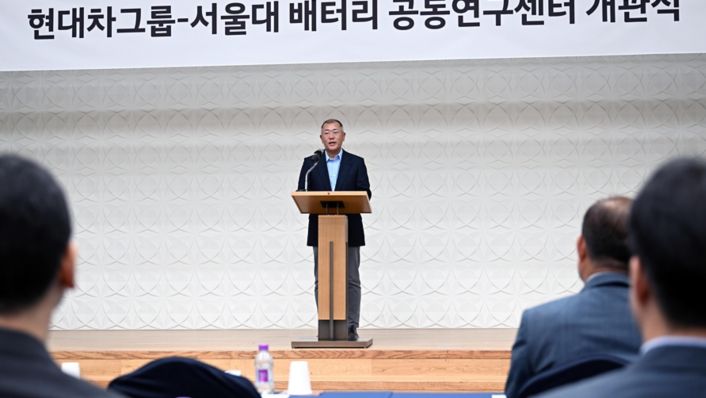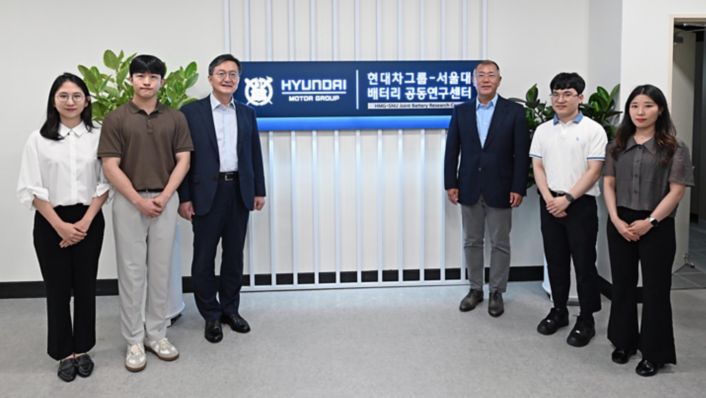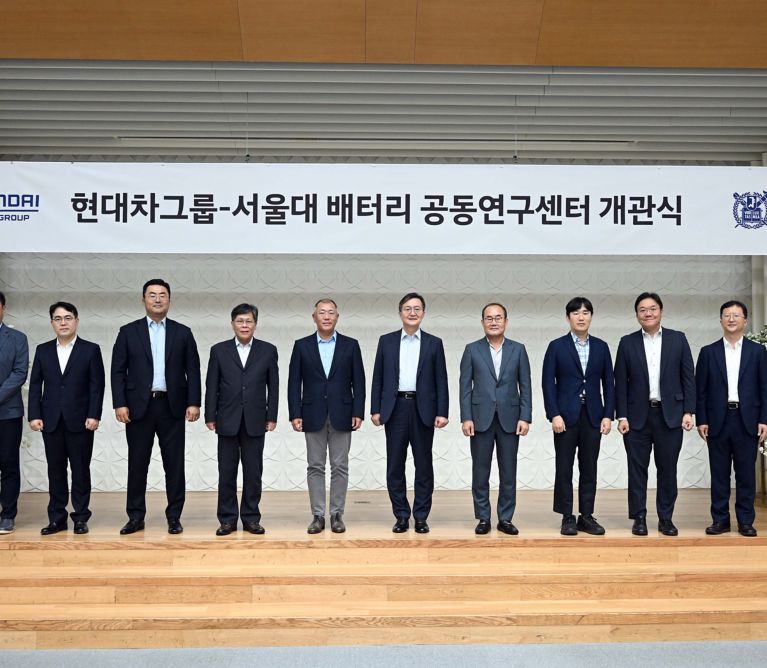- Hyundai Motor Group opens a Joint Battery Research Center at Seoul National University to secure and advance key battery technologies
- Successful collaboration towards carbon neutrality and a thriving battery research ecosystem
- Center constructed with a scale of 901m2 spanning three floors, comprising seven research labs for battery development and analysis
- Collaboration to undertake 22 joint research projects focused on four key divisions, including lithium metal and solid-state batteries
- Introduction of advanced research infrastructure, such as precision battery analysis equipment, enabling mass-production-oriented research and development
- Hyundai Motor Group to invest over KRW 30 billion by 2030 to facilitate research at the Joint Battery Research Center
- Hyundai Motor Group Executive Chair Euisun Chung highlights commitment to “lead the way in propelling the transition to electrification” through joint efforts
Press material
-
Download
-
Images
Hyundai Motor Group (the Group) today announced the inauguration of its Joint Battery Research Center with Seoul National University (SNU). This collaborative effort between the Group and SNU aims to advance battery technologies and foster industry-academia cooperation to establish global leadership in the battery field.
The opening ceremony of the Joint Battery Research Center took place at Seoul National University’s main campus and was attended by esteemed guests, including Euisun Chung, Executive Chair of Hyundai Motor Group; Yong Wha Kim, President and Chief Technology Officer of Hyundai Motor Group; Heung Soo Kim, Executive Vice President and Head of Global Strategy Office of Hyundai Motor Group; and Chang Hwan Kim, Senior Vice President and Head of Battery Development Center of Hyundai Motor Group.
From Seoul National University, Hong Lim Ryu, President of Seoul National University; Yoo Suk Hong, Dean of Seoul National University College of Engineering; Seung Hwan Ko, Associate Dean of Research Affairs of the College of Engineering; Jong Chan Lee, Head of the School of Chemical and Biological Engineering; and Jang Wook Choi, Head of the Joint Battery Research Center and Professor at the School of Chemical and Biological Engineering attended the inauguration ceremony.
The Joint Battery Research Center will be the starting point for battery technology with improved performance and robust safety in line with Hyundai Motor Group’s preemptive innovation in the field of electrification. We expect that the best faculty and graduate students will create synergy with Hyundai Motor Group’s competent researchers, laying the groundwork for various innovations ranging from the basics of batteries to applications.
Our mission to develop a diverse range of mobility solutions equipped with advanced batteries is driven by our strong commitment to a sustainable environment for future generations. Through pioneering joint research and development efforts, we hope to empower all researchers to lead the way in propelling the transition to electrification of the mobility industry.

The Joint Battery Research Center began to take shape in November 2021, when the Group and Seoul National University signed a memorandum of understanding (MoU) for the ‘establishment of a joint battery research center and mid- to long-term joint research’ based on the consensus on realizing carbon neutrality and creating a battery research ecosystem.
To foster close cooperation among researchers, the new research facility will secure a dedicated space for battery-only research within the expanded Institute of Chemical Processes of Seoul National University, spanning three floors (901 m2). It will consist of seven laboratories and conference rooms for battery development, analysis, measurement, and process. This is the first time that a research facility specializing in electric vehicle (EV) batteries has been built within Seoul National University.
With the opening of the Joint Battery Research Center, the Group will work with top battery experts in Korea to lay the groundwork for research and development of battery-related technologies. The Joint Battery Research Center aims to focus on advanced research into leading next-generation battery technologies that can dramatically increase EV driving distance and shorten charging time, as well as research on battery condition monitoring technology and innovative process technology.
Specifically, a total of 22 joint research projects will be carried out in four divisions, including lithium metal batteries, solid-state batteries, battery management systems (BMS) and battery process technology. A total of 21 professors and master’s and doctorate-level talents from eminent Korean universities will participate in the research. 14 of the 22 research projects will be related to lithium metal and solid-state batteries, focusing their core capabilities on developing next-generation batteries.
In the field of lithium metal batteries, research will be conducted on high-durability lithium-electrolyte material element technology and shape analysis to minimize deterioration, while in the field of solid-state batteries, research will be conducted on sulfide-based anode materials, electrode/electrolyte coating methods and ultra-high energy density cathode active materials.
A key feature of the Joint Research Battery Center will be its focus not only on theoretical research, but also research and development that considers mass production. In the case of general industry-academia research, additional time and cost are inevitable to apply the results to mass-produced products.
To that end, the Joint Battery Research Center has the same level of research infrastructure as the state-of-the-art equipment applied to the Hyundai Motor and Kia R&D centers, such as precision battery analysis equipment, high-precision rheometers, cell manufacturing equipment, and impedance measuring devices, so that the university’s research results can be quickly applied to products.
Furthermore, the Group has appointed Professor Jang Wook Choi, an esteemed expert in battery science, as the head of the Joint Battery Research Center. Professor Choi will oversee the overall research projects and management of technology development.
The Group will have a fully-fledged support system to help the Joint Battery Research Center secure capabilities to develop next-generation batteries that lead the industry. To support the center’s smooth research activities, the Group will invest over KRW 30 billion by 2030. The investment includes the establishment of the center and preparation of experimental equipment.
In addition, researchers from Hyundai Motor and Kia will be dispatched to the center to participate as members of the joint research team, maximizing research synergy through close communication and sharing of expertise. Through consultations and seminars on battery technology, insights and development directions will be discussed, alongside a consultative body that will be formed regularly to share information on global battery industry trends and results.
Above all, the Group expects to pave the way for South Korea to become one of the world’s leading battery technology houses by fostering outstanding talent in the battery sector. Meanwhile the Group is also actively promoting next-generation talent by operating various industry-academic cooperation programs in collaboration with eminent universities in Korea.

Hyundai Motor Group accelerates development of next-generation batteries, including solid-state, aiming to produce 3.64 million EVs by 2030
Hyundai Motor Group recently announced through Hyundai Motor’s CEO Investor Day that it plans to secure global top-tier leadership by producing a total of 3.64 million EVs by 2030.
Based on its long-standing experience in developing and mass-producing EVs, the Group is also actively seeking to secure bold investment and development capabilities in the key battery sector. In particular, the Group plans to encompasses all areas of batteries by stabilizing material supply, strengthening battery design and management capabilities and developing next-generation batteries.
Hyundai Motor will invest KRW 9.5 trillion over the next 10 years to actively improve battery performance, develop advanced technologies for next-generation batteries, and build infrastructure.
In comparison to 2018 prices, the cost of batteries will be lowered by 75 percent in 2026, and 45 percent in 2030 to enhance the affordability and practicality of EVs. Around 2025, lithium ferro phosphate (LFP) batteries, which are jointly developed with battery companies, will be applied to new EVs for the first time.
In order to accelerate the development of lithium metal and solid-state batteries and verify their mass production capabilities, Hyundai Motor and Kia’s Uiwang Research & Development Center will complete construction of the Next-generation Battery Research Building next year. The batteries developed in the new building will be used for various mobilities, beyond EVs, such as robotics and advanced air mobility (AAM).
The Group is also focusing on securing battery management capabilities that can optimize EV performance. The Group will push to implement EVs with longer driving ranges, longer life cycles, and safety by upgrading battery management systems (BMS) as well as battery conditioning technologies, such as battery preheating and cooling.
In the mid- to long-term, the Group will additionally establish a system to recycle waste batteries and recycle raw materials to protect the environment and secure sustainable raw materials. The Group plans to complete a sustainable ‘battery life cycle’ in which batteries are safely recovered and raw materials are extracted and reused for battery manufacturing.
The Group is steadily expanding external cooperation to secure battery capabilities, by establishing joint ventures with major battery companies, such as SK On and LG Energy Solution, to ensure stable supply and demand of batteries.
Working with companies, such as Solid Power in the U.S., to secure solid-state battery elements and process technologies; Solid Energy System (SES) to develop lithium metal batteries, the Group continues to conduct joint research with startups as well as investing stakes for next-generation battery developments. The opening of the Joint Battery Research Center is an extension of the Group’s continued efforts to cooperate in an open manner to the benefit of all.













